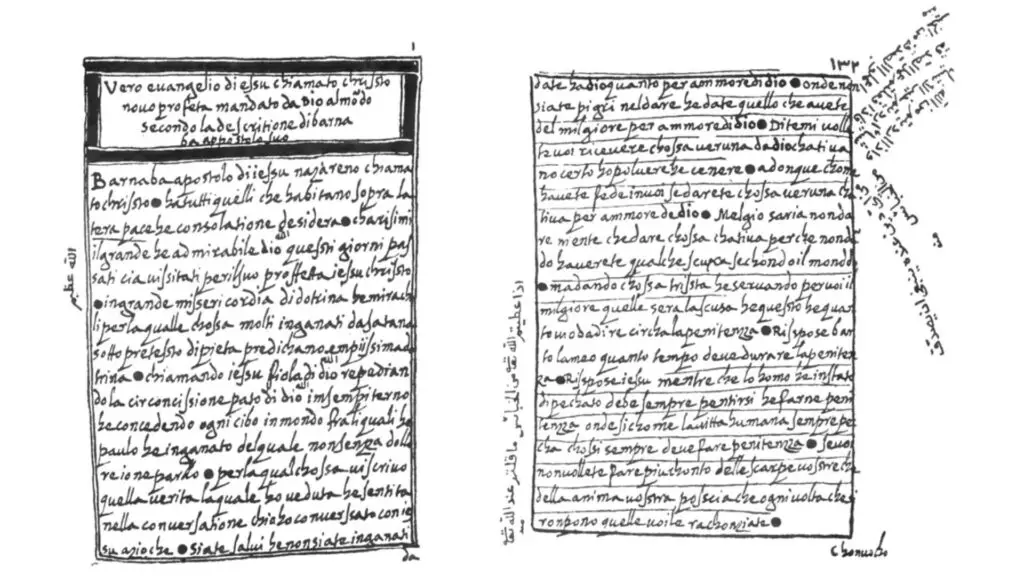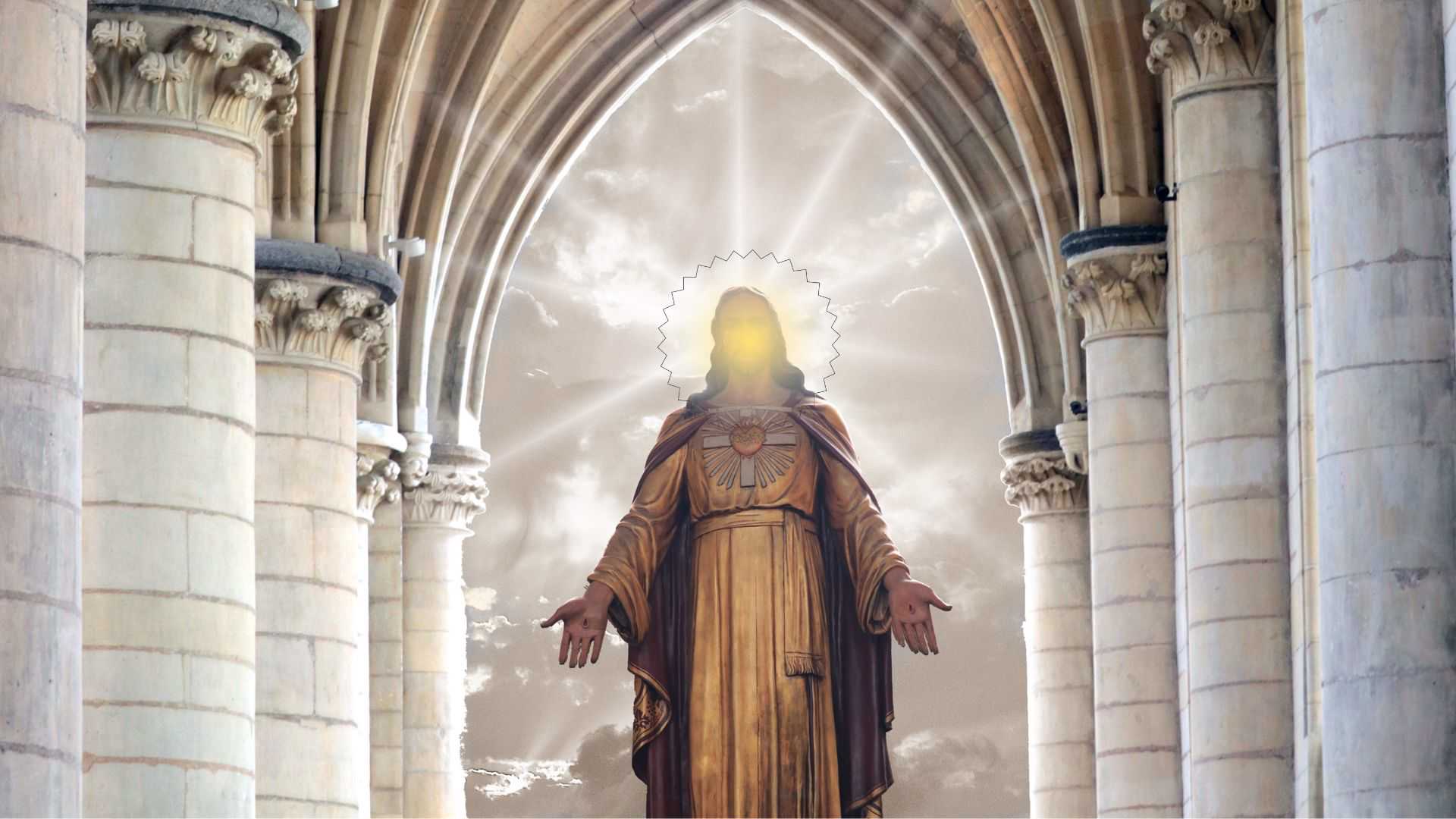The Gospel of Barnabas is a religious text that purports to be a lost Gospel, claiming to provide an account of the life and teachings of Jesus Christ (PBUH). Apart from providing accounts of Jesus (PBUH) that are in accordance with the Islamic view of Jesus (PBUH), such as the denial of Jesus’s Crucifixion and Jesus (PBUH) not being the son of God (or God), it also provides predictions about coming of Prophet Muhammad (pbuh). However, it is not considered canonical by any major Christian denomination, and its authenticity and origins are highly disputed among Christian and Muslim scholars.
The Gospel of Barnabus is considered a Forgery

The Gospel of Barnabas is not accepted by mainstream scholars as an accurate historical account of Jesus’ life. It is generally believed to be a later forgery, likely dating from the medieval period. It was written in the Middle Ages and it is in two manuscripts: Spanish and Italian, too late to be written by the Disciple Barnabus. It contains many elements that are inconsistent with the historical and theological understanding of Jesus (PBUH) found in the New Testament. While some of its doctrines are in contradiction with the Quran, many of them are in line with the Quran and reject the Bible, particularly the New Testament.
Quranic version of Jesus (PBUH)
Regarding the Quranic version of Jesus (PBUH), the Quran is the holy book of Islam and is the literal word of God as revealed to the Prophet Muhammad (PBUH). The Quran contains references to Jesus (PBUH), whom Muslims regard as a Prophet, not the Son of God. The Quranic account of Jesus (PBUH) differs in many aspects from the biblical accounts found in the New Testament.
Similarities between the Gospel of Barnabus and the Quranic version of Jesus (PBUH)
The Gospel of Barnabas presents a narrative of the life and teachings of Jesus (PBUH) that differs significantly from the accounts found in the New Testament of the Christian Bible.
Here are some key points from the Gospel of Barnabas about Jesus:
- Denial of Jesus as the Son of God: The Gospel of Barnabas contradicts the Christian doctrine of the Trinity and explicitly denies that Jesus (PBUH) is the Son of God. Instead, it portrays Jesus (PBUH) as a prophet and servant of God.
- Denial of Crucifixion: One of the most notable differences is the denial of the crucifixion of Jesus (PBUH). The Gospel of Barnabas asserts that Jesus (PBUH) was not crucified; rather, someone else was crucified in his place, and Jesus was taken up to heaven. It says that Judas Iscariot (the one who betrayed Jesus (PBUH)) replaced Jesus (PBUH) at the crucifixion. Judas was made to look like Jesus (PBUH) and speak like him, so instead of Jesus (PBUH), he was arrested and crucified. Thus, Jesus (PBUH) was never crucified. According to the Quran (Surah Al-Nisa 4:157), Jesus was not crucified but was made to appear so, and someone else was made to resemble him.
- Affirmation of Prophet Muhammad: The Gospel of Barnabas contains references to a coming prophet named “Ahmad,” which some interpret as a reference to Prophet Muhammad (PBUH), the last Prophet of Islam. This has led to the suggestion that the Gospel of Barnabas was altered or created to support Islamic beliefs. The first of Jesus’ nine direct mentions of Prophet Muhammad (PBUH) is found in Chapter 39 (Read this Wikipedia account for better understanding). The gospel describes how Jesus was transfigured and how he announced that Prophet Muhammad (PBUH) would be the Messiah, the one who would come after him.
- Nontrinitarianism: While Christians believe in a Triune God (one God that is divided into three: Father, Son, and the Holy Spirit) and Trinity, Islam completely rejects Trinitarianism and believes in Tawhid (One God that is indivisible). Jesus (PBUH) never claimed to be God or son of God. The Gospel of Barnabas has statements attributed to Jesus (PBUH) in which he rejects being the Son of God.
- Importance of the Law of Moses: The Gospel of Barnabas emphasizes the importance of the Mosaic Law, similar to the Old Testament, in contrast to the Christian New Testament’s teachings on the fulfillment of the law through Jesus (PBUH).
Contradictions with the Quran and Factual Errors
There any many errors in the Gospel of Barnabas and some contradictions with the Quran. some of which are:-
- Jesus not being the Messiah: In chapters 42 and 96 of the Gospel of Barnabas, Jesus (PBUH) said: “I am not the Messiah”. But in Islam, we believe that Jesus (PBUH) was indeed the Messiah, the anointed one. We just don’t believe that he was God or son of God or he was crucified, no.
- Wine Barrels: According to chapter 152, wine barrels were in use when Jesus (PBUH) lived. but there were no wine barrels at that time, only big jars. and obviously, as Muslims, we don’t believe that Jesus (PBUH) had wine, or indulged in wine, or had anything to do with wine because it is Haram!
- Capernaum and Nazareth: In chapters 20–21, it shows that Jesus (PBUH) “went up to Capernaum”. but Capernaum was only at shore, not uphill. Instead, Nazareth was uphill.
Conclusion
While the Quranic version of Jesus (PBUH) and the Gospel of Barnabas share certain similarities, it is important to note that the authenticity of the Gospel of Barnabas itself is highly questionable. Therefore, using it as a reliable source to validate the correctness of the Quranic version of Jesus (PBUH) is not academically sound.
For us Muslims, we have the living miracle called the Holy Quran amongst us. It is the direct word of God, unadulterated, uncorrupted by any human, safe and secure in Al-Lawh Al-Mahfuz and we should be thankful for that. We should only look up to the Quran and Sunnah and abide by them religiously. It contains the only truth. It is the path of the righteous.
This was all about the Gospel of Barnabas. Read more Islamic Blogs or Follow us on social media for daily Islamic reminders.






